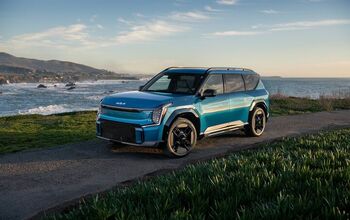Two Out Of Three Japanese Not Doing So Well In China

Except for Nissan, which outpaced the market, the big Japanese automakers are having a bit of a hard time in China. Toyota and Honda received a lot of bad press in the Middle Kingdom. Toyota for its recalls. Honda for its series of strikes. Whatever the reason, both are losing market share. This doesn’t bode well for the rest of the year, when the red-hot Chinese market is expected to cool down a bit.
In the January-June period, the Chinese market as a whole grew 47.7 percent on the year. Toyota’s Chinese sales grew only 27.4 percent, Honda is up only 22 percent. Market leaders GM (up 48.5 percent) and VW (up 45.7 percent) kept up with the Joneses, I mean, Zhangs. The best of the group was Nissan with a 51.4 percent growth.
No, it’s not as easy as saying that the Chinese have a disdain for everything Japanese and just adore American and German cars. It’s that Nissan has the better cars and the better marketing, while Honda and Toyota have problems. What is their answer?
Discounts.
“Japanese carmakers are rushing to cut prices, which is having repercussions on our operations,” complained a Beijing Volkswagen car dealer to The Nikkei [sub]. To fight back, they have to throw-in navigation systems and other accessories. That hurts an upstanding dealer who’s used to a heavy markup to reward him for the timely supply of a car that is in high demand.
Toyota is assumed having cut its prices by 10 percent in China. Following Toyota’s lead, Honda also cut prices.
Having the right cars and the right marketing will become increasingly important as the growth cools off. Nobody expects the market to implode. But Zeng Qinghong, general manager of Guangzhou Automobile Group Co., the Chinese partner in separate joint ventures with Toyota and Honda, said: “The time is coming to an end when cars sell if they are simply put on the market. Automakers are entering an era of natural selection.”

Bertel Schmitt comes back to journalism after taking a 35 year break in advertising and marketing. He ran and owned advertising agencies in Duesseldorf, Germany, and New York City. Volkswagen A.G. was Bertel's most important corporate account. Schmitt's advertising and marketing career touched many corners of the industry with a special focus on automotive products and services. Since 2004, he lives in Japan and China with his wife <a href="http://www.tomokoandbertel.com"> Tomoko </a>. Bertel Schmitt is a founding board member of the <a href="http://www.offshoresuperseries.com"> Offshore Super Series </a>, an American offshore powerboat racing organization. He is co-owner of the racing team Typhoon.
More by Bertel Schmitt
Latest Car Reviews
Read moreLatest Product Reviews
Read moreRecent Comments
- Brandon I would vote for my 23 Escape ST-Line with the 2.0L turbo and a normal 8 speed transmission instead of CVT. 250 HP, I average 28 MPG and get much higher on trips and get a nice 13" sync4 touchscreen. It leaves these 2 in my dust literally
- JLGOLDEN When this and Hornet were revealed, I expected BOTH to quickly become best-sellers for their brands. They look great, and seem like interesting and fun alternatives in a crowded market. Alas, ambitious pricing is a bridge too far...
- Zerofoo Modifications are funny things. I like the smoked side marker look - however having seen too many cars with butchered wire harnesses, I don't buy cars with ANY modifications. Pro-tip - put the car back to stock before you try and sell it.
- JLGOLDEN I disagree with the author's comment on the current Murano's "annoying CVT". Murano's CVT does not fake shifts like some CVTs attempt, therefore does not cause shift shock or driveline harshness while fumbling between set ratios. Murano's CVT feels genuinely smooth and lets the (great-sounding V6) engine sing and zing along pleasantly.
- JLGOLDEN Our family bought a 2012 Murano AWD new, and enjoyed it for 280K before we sold it last month. CVT began slipping at 230K but it was worth fixing a clean, well-cared for car. As soon as we sold the 2012, I grabbed a new 2024 Murano before the body style and powertrain changes for 2025, and (as rumored) goes to 4-cyl turbo. Sure, the current Murano feels old-school, with interior switchgear and finishes akin to a 2010 Infiniti. That's not a bad thing! Feels solid, V6 sounds awesome, and the whole platform has been around long enough that future parts & service wont be an issue.

































Comments
Join the conversation
"“Japanese carmakers are rushing to cut prices, which is having repercussions on our operations,” complained a Beijing Volkswagen car dealer to The Nikkei [sub]. To fight back, they have to throw-in navigation systems and other accessories. That hurts an upstanding dealer who’s used to a heavy markup to reward him for the timely supply of a car that is in high demand." Is this car dealer trying to elicit sympathy because someone is undercutting him and eating into his margins (which are "heavy" by his own admission)? Or am I being really unfair...? "I was making money hand over fist and these companies start cutting their prices to sell their cars and it eats into my profits. So unfair!"
Very true. If money is tight, people default to the most reliable cars, often with little consideration given to other aspects...its about money. When cash is flowing freely, people just take on the "eh, I can afford repairs for not-ugly" attitude. Take me for example: student, wants fun cheap transpo. Really wants? Fully-loaded Jetta that he adored. Actually gets? Mazda 3 Sport, because timing belts, blown turbos and electrical gremlins are scary.